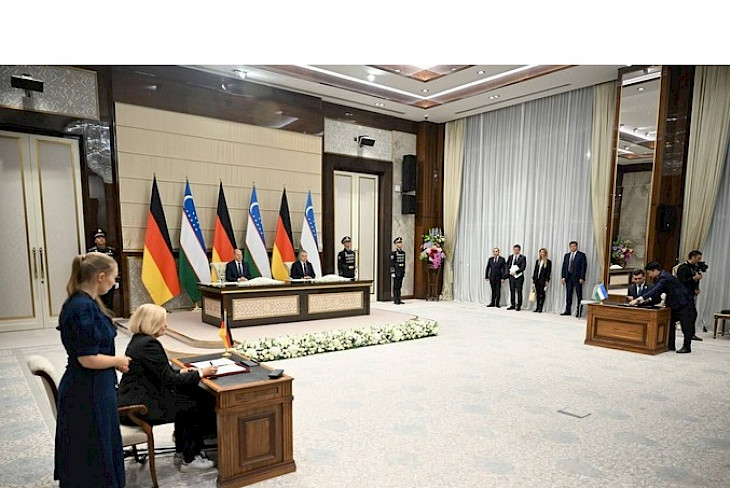Uzbekistan and Germany signed an intergovernmental agreement on comprehensive partnership in the field of migration and mobility during German Chancellor Olaf Scholz's visit to Tashkent on September 15.
According to Uzbekistan's Ministry of Employment and Poverty Reduction, the document consists of 25 articles and promotes fair mobility of skilled professionals, including students and individuals undergoing vocational education, as well as journalists and scientists seeking to work in both countries.
The agreement focuses primarily on specialists in elder and patient care, as well as in Germany’s healthcare system, which faces a significant workforce shortage, reports *Deutsche Welle*. Uzbekistan plans to send 800 nurses this year and to establish training for medical and transportation workers in Tashkent.
The agreement is also aimed at encouraging and facilitating temporary migration for work purposes, promoting long-term stays for employment, vocational education, and professional development.
Both sides will also cooperate to prevent and combat illegal migration, human trafficking, labor exploitation, and forced labor, as well as work on the protection of victims.
Furthermore, the agreement provides for the facilitation of the return of citizens who have not fulfilled the residency or entry conditions in either country.
Article 11 of the document outlines the conditions for the readmission of third-country nationals and stateless persons illegally residing in either country. These individuals must hold a residence permit, valid visa, or other documents proving their entry into the first country when entering the second, according to the press service of Uzbekistan's Ministry of Foreign Affairs.
Readmission (the acceptance back, different from deportation) is an agreement by a state to accept back its citizens or foreigners who previously resided or were present on its territory, and are being sent back from another state based on an agreement between the two countries.
The new agreement, which was prepared over several months, is expected to simplify legal migration to Germany for Uzbek citizens. At the same time, Tashkent will have to accept those who resided in Germany without legal grounds. According to the German news agency DPA, 13,700 Uzbeks currently reside in Germany, most of them legally. Around 200 are expected to be deported to Uzbekistan.
"This follows the pattern of agreements we are now aiming to establish in parts with many countries around the world. We are ensuring the necessary immigration of skilled workers that Germany needs for its economy to grow. At the same time, we are agreeing on simple, non-bureaucratic procedures for those who need to return. This is the right way to tackle a big task, and in this sense, this agreement is a small building block in the construction of a very large wall," Olaf Scholz commented on the agreement.
In June, Der Spiegel reported that the German government was secretly negotiating with Uzbekistan to secure the possibility of deporting Afghan nationals without refugee status back to Afghanistan, without direct agreements with the Taliban.
According to the publication, a German delegation visited Tashkent at the end of May on behalf of Interior Minister Nancy Faeser to discuss this plan with the Uzbek government.
"The Germans presented the Uzbek government with a concrete plan," the publication stated. "According to it, Germany could transport Afghan deportation candidates by charter flights to Tashkent. From there, Afghan citizens would be transferred to Kabul on private KamAir airline planes. This route is designed to ensure that Berlin does not have to negotiate directly with the Taliban government but can still carry out deportations of Afghans subject to expulsion."
The agreement includes a clause describing such a scheme, but without mentioning Afghanistan. Specifically, it allows for the possibility of using either Uzbekistan or Germany as transit countries for the return of third-country nationals and stateless persons to a third country. The key condition is that the third country accepting these individuals must guarantee their acceptance.
The transit country reserves the right to refuse transit from its territory under conditions strictly defined by the agreement. These include threats to human life, public health, national security, and similar issues.
In response to a question about whether the deportation of Afghans through Uzbekistan would be simplified, the German Chancellor stated that "confidential discussions on cooperation in many areas are ongoing."
Germany has not deported Afghan citizens to their homeland since mid-2021, when the Taliban came to power in Afghanistan, due to concerns that they could face torture or execution there. Berlin officially does not recognize the Taliban government and does not engage in negotiations with them.
However, amid growing anti-migrant sentiments in Germany, the authorities began discussing the resumption of Afghan deportations. On the morning of August 30, Berlin resumed deportations - 28 convicted Afghans flew from Leipzig to Kabul on a chartered Qatar Airways flight.
German Chancellor Olaf Scholz's first official visit to Uzbekistan took place on August 14-15, 2024.
CentralasianLIGHT.org
September 20, 2024.

